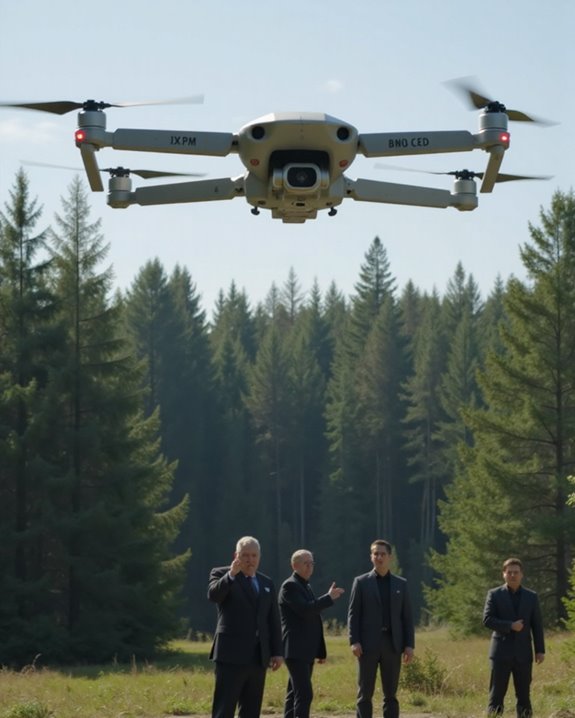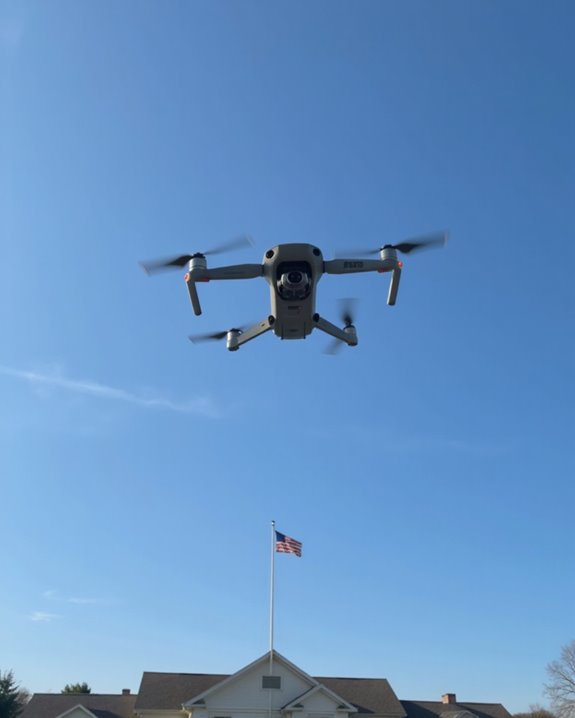Canada’s women’s soccer team was caught red-handed when French police spotted a drone buzzing over New Zealand’s practice at Stade Geoffroy-Guichard before the Paris 2024 Olympics! The culprit? A Canadian staff member, nabbed after authorities traced the drone’s registration, compared records with Transport Canada, and found evidence linking coaches Joseph Lombardi and Jasmine Mander. With official apologies, suspensions, and a big headache for Team Canada, the drama didn’t end there—next up: the wild, rule-filled world of Olympic drone security!
Key Takeaways
- French authorities immediately detained a Canadian staff member flying a drone over New Zealand’s training session in July 2024.
- The drone’s unique registration number led investigators to Canadian support staff through cross-checks with Transport Canada records.
- Forensic analysis of text messages revealed assistant coach Jasmine Mander and others were aware of the unauthorized drone use.
- Head coach Beverly Priestman and staff suspensions, along with Lombardi’s confession, confirmed team involvement in the incident.
- The New Zealand Olympic Committee filed a formal complaint, prompting public apologies and an investigation by the Canadian Olympic Committee.
The Incident at Stade Geoffroy-Guichard
The scene at Stade Geoffroy-Guichard took a dramatic—and frankly, unexpected—turn on July 22, 2024, when a Canadian women’s soccer support staff member decided to take drone flying to a whole new level. With the stadium’s distinct features, like its sweeping terraces and open sightlines, you’d think event logistics would be focused on crowd flow or concession stands—not aerial espionage! But that morning, as New Zealand’s team trained on the lush field, a drone buzzed overhead, capturing footage without authorization. The incident was immediately reported, and French authorities detained the operator. The Canadian team’s preparations, already complicated by tight Olympic schedules and complex logistics, now faced chaos and embarrassment. Suddenly, the story wasn’t about soccer, but about drones, apologies, and integrity. Such incidents highlight the importance of understanding surveillance drone regulations to avoid legal complications in international sporting events.
French Drone Laws and Olympic Security
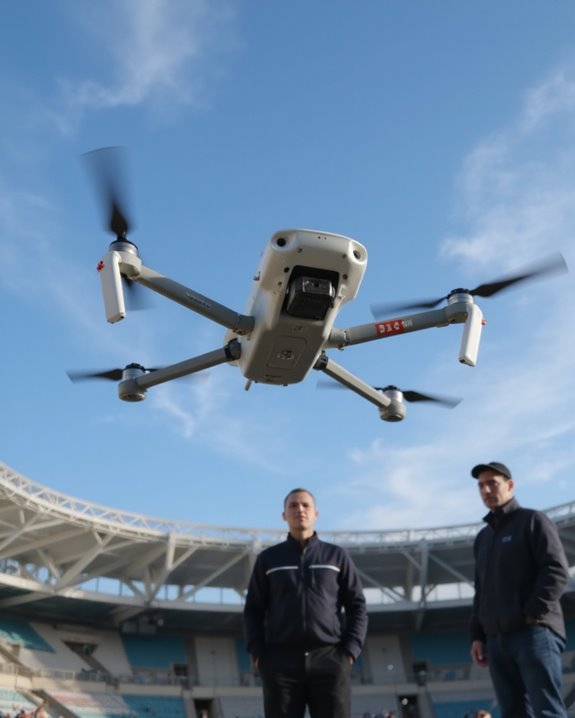
Rules matter—a lot—when it comes to flying drones in France, especially with the Olympics in town! Imagine piloting a mini helicopter above Paris and suddenly realizing you’re in a “no-fly” zone—yikes! French drone laws are strict: drones must have a CE mark, stick to their C0-C4 classification, and never soar above 120 meters. Anything weighing over 800 grams? Register it with the DGAC—no exceptions. During Olympic events, security innovations take center stage, with no-fly zones and authorized operators only. Thanks to Drone Evolution, these flying machines have become essential for surveillance. Operators must always maintain visual line of sight, follow EU regulation 2019/947, and complete a risk assessment near stadiums. Even high-tech gadgets have to play by the rules! Additionally, the deployment of drone signal blocking technologies ensures enhanced security by preventing unauthorized drone communication near sensitive areas.
How the Drone Operator Was Identified

Ever wonder how officials actually catch someone flying a drone where they shouldn’t—especially with all those Olympic security eyes on the skies? It’s not just a matter of binoculars and luck! The first step involves Registration Checks. Since drones in Canada must display a unique registration number, authorities simply note down the number from the drone itself, like a tiny license plate. Next comes the Certification Review. Investigators compare the registration details with Transport Canada’s records to see who owns the drone and whether that person has the right certificate—Basic or Advanced Operations. If the operator’s paperwork doesn’t match the flight conditions, or if there’s no certificate at all, that’s a big red flag. It’s a smart, step-by-step detective process. Many drone operators now use FAA Compliant Remote ID Modules which broadcast real-time location and identification data, making it easier for authorities to pinpoint unauthorized flights.
Evidence Linking the Canadian Team
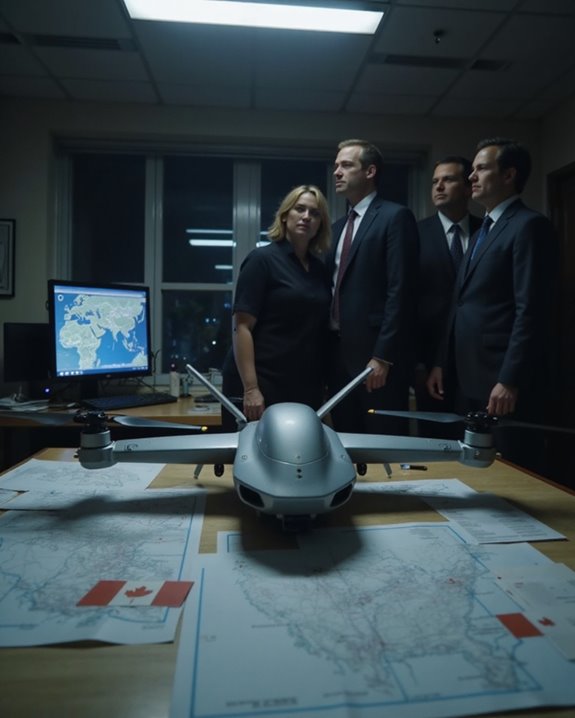
Imagine the surprise when officials realized this wasn’t just a rogue drone pilot acting alone—there was a whole team web behind the scenes! Circumstantial Evidence quickly started piling up. Forensic Analysis of Joseph Lombardi’s phone revealed text messages with assistant coach Jasmine Mander, showing she knew about the drone flights. This wasn’t just a “personal initiative,” as Lombardi claimed; coaches were clearly in the loop. When investigators saw Mander’s texts and her sudden suspension—alongside head coach Beverly Priestman—it was hard not to see a pattern. The Canadian Olympic Committee admitted that even the head coach was “likely” aware. Combine that with Lombardi’s confession and staff suspensions, and it’s clear the evidence pointed to broader team involvement, not just one bad apple!
Reactions From Canada and New Zealand
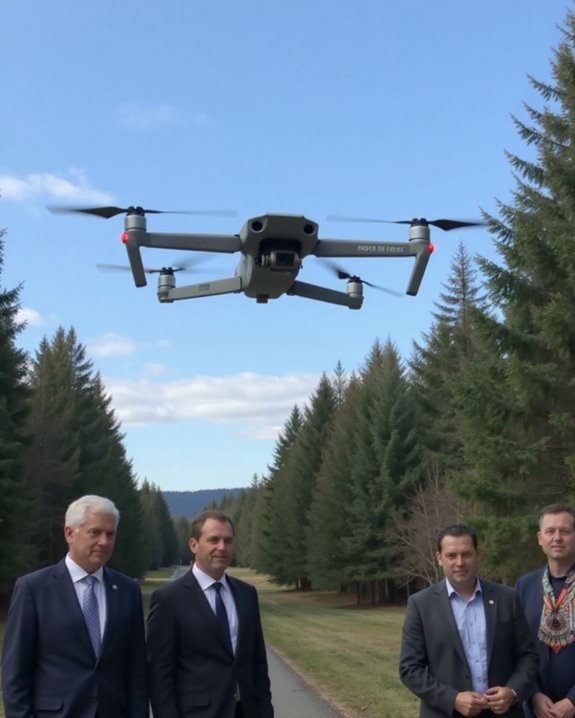
When the news broke about Canada’s drone escapade, reactions from both sides of the field were swift and strong! Team Sentiments ran high—Canada’s Olympic Committee was “shocked and disappointed,” quickly offering Official Apologies to New Zealand and promising a full investigation. Sanctions followed, especially after a second drone incident came to light. Meanwhile, the New Zealand Olympic Committee wasn’t holding back either. They filed a formal complaint with the IOC’s integrity unit and demanded a thorough review from Canada. New Zealand Football publicly addressed the issue, and local police even detained the drone operator, which you don’t see every day! Media outlets pounced, with public opinion split between outrage and skepticism, highlighting just how much fair play and sportsmanship matter in global competitions.
Legal, Regulatory, and Ethical Implications
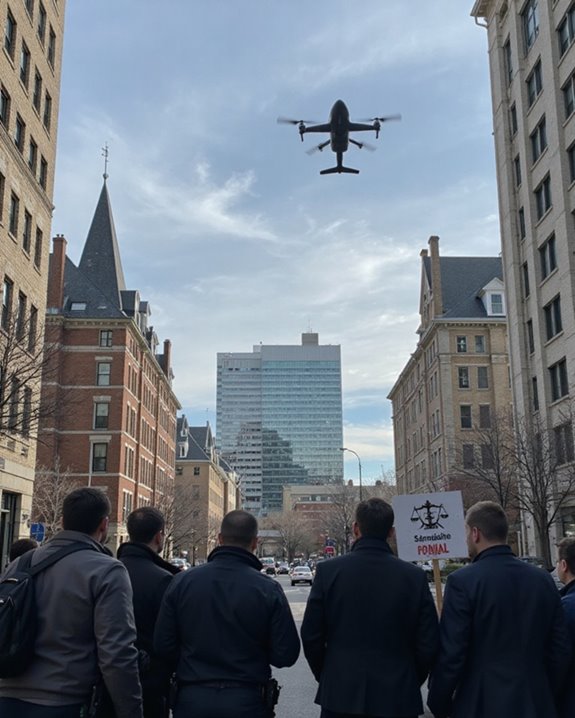
Although drones have opened up a whole new world of possibilities, they also bring a tangle of rules, responsibilities, and big ethical questions that can make anyone’s head spin! In Canada, drone operators face hefty fines—up to $5,000 for individuals and $25,000 for corporations—if they skip legal steps like getting a Special Flight Operations Certificate. Transport Canada keeps things in check with strict drone registration, pilot certificates, and constant Regulatory Updates, even banning certain flights until late 2025. But Drone Ethics go beyond paperwork. With drones buzzing overhead, privacy worries soar—nobody wants their backyard barbecue caught on camera! Enforcement is tricky, though, since police and public reports often drive action. Staying compliant means juggling complex rules, ethical decisions, and fast-changing technology.
Lasting Impact on International Sports Competitions
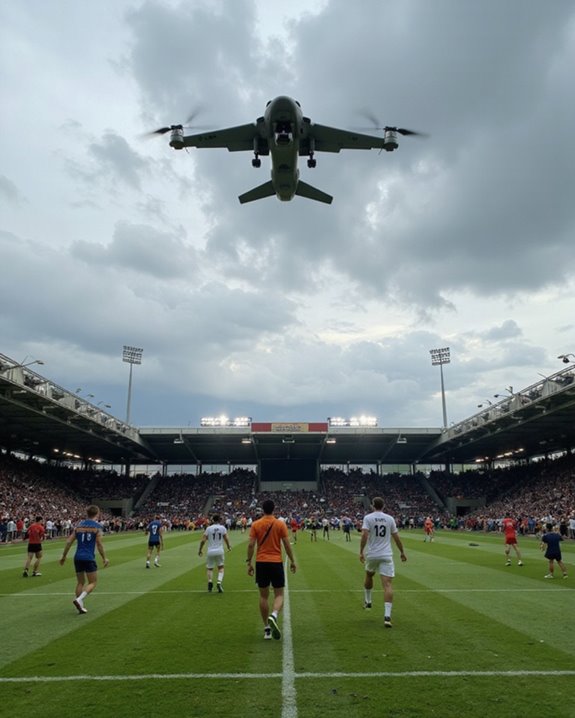
The fallout from Canada’s drone misstep doesn’t just end with a stack of paperwork and a stern warning—it spills right onto the world’s biggest sports stages. When coaches and staff get booted before the Olympics, you can bet the Morale Impact hits hard—like scoring an own goal in the final minutes! Not only does this mess with team unity, but it sends a signal to every competitor: eyes are everywhere. Now, Surveillance Trends in sports are under the microscope, with organizers ramping up security and slapping on stricter rules. Canada’s reputation has taken a hit, meaning other countries might be a little less friendly when the next World Cup rolls around. The whole episode proves: one drone can change the game for everyone.
Frequently Asked Questions
What Type of Drone Was Used During the Incident?
Like a silent moth circling stadium lights, the device was a small, consumer-grade drone of Chinese manufacturer origin. Drone specifications included lightweight construction, video recording capabilities, and covert maneuverability—features ideal for discreet surveillance in restricted environments.
Has Canada Used Drones in Previous Tournaments?
In past tournaments, Canada demonstrated early drone adoption by using aerial surveillance to monitor opposing teams’ training sessions. This recurring tactic has been observed in events like World Cup qualifiers, the Olympics, and Copa America competitions.
Did Weather Conditions Affect Drone Operation That Day?
Could storm impact or fog effects have compromised drone stability that day? Weather conditions, while not explicitly detailed in existing reports, are known to greatly influence drone operation, potentially affecting control, visibility, and overall operational safety.
Were Any Players Injured or Disrupted by the Drone?
No player injuries were reported as a direct result of the drone incident. However, minor game disruption occurred, with players expressing concern and distraction during training, potentially impacting focus and preparation ahead of the Olympic soccer match.
What Penalties Do Drone Operators Face Under French Law?
Drone operators in France face escalating risks: international penalties, hefty fines, and even imprisonment loom under recent legal reforms. Equipment confiscation, registration failures, and violations in restricted zones all trigger serious consequences, enforced by vigilant authorities using advanced surveillance.

